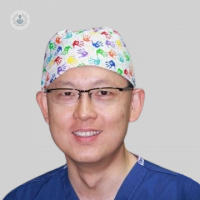Voice disorders: Exploring causes and treatments
Written in association with:Voice disorders can have a significant impact on daily life and interpersonal communication. From hoarseness and vocal fatigue to complete loss of voice, voice disorders encompass a wide range of conditions that affect people of all ages.
Here, Mr Michael Kuo, renowned consultant ENT surgeon, provides an expert insight into the world of voice disorders, exploring their causes, diagnosis, and treatment options.

What are the common symptoms of voice disorders?
Voice disorders can manifest in several ways. Common symptoms include:
- Hoarseness or roughness in the voice: The voice may sound raspy, strained, or breathy.
- Reduced pitch range: Difficulty reaching high or low notes when speaking or singing.
- Pain or discomfort when speaking or swallowing: Soreness, irritation, or a sensation of a lump in the throat may be present.
- Loss of voice: Refers to partial or complete loss of voice, known as aphonia or dysphonia, respectively.
These symptoms can vary in severity and duration depending on the underlying cause of the voice disorder.
What can cause voice disorders?
Voice disorders can be caused by various factors, including:
- Overuse or misuse of the voice: Excessive talking, yelling, or singing without proper vocal technique can strain the vocal cords and lead to voice disorders.
- Vocal cord nodules or polyps: Non-cancerous growths on the vocal cords, often caused by vocal abuse, smoking or chronic irritation, can disrupt vocal cord vibration and affect voice quality.
- Acid reflux: Gastroesophageal reflux disease (GERD) can cause stomach acid to flow back up into the throat, resulting in irritation and inflammation of the vocal cords.
- Vocal cord paralysis: Damage to the nerves controlling the vocal cords can result in paralysis, affecting vocal cord movement and function.
Can allergies or respiratory infections affect vocal health?
Allergies and respiratory infections can indeed affect vocal health.
Allergic reactions can trigger inflammation of the mucous membranes lining the throat and vocal cords, leading to symptoms such as hoarseness or voice changes.
Respiratory conditions such as laryngitis (inflammation of the voice box), bronchitis, or pneumonia can cause swelling and irritation of the throat and vocal cords, resulting in voice disturbances.
How are voice disorders diagnosed?
Diagnosing voice disorders typically involves a combination of medical history evaluation, physical examination, and specialised tests.
The diagnostic process involves:
- Medical history evaluation: The specialist will start by asking about the patient’s symptoms, medical history, occupation, vocal habits, and any factors that may contribute to voice disturbances.
- Physical examination: The specialist will perform a thorough examination of the throat, neck, and vocal cords to assess for signs of inflammation, swelling, lesions, or structural abnormalities.
- Laryngoscopy: A laryngoscopy involves examining the throat and vocal cords using a laryngoscope, which is a thin, flexible or rigid tube with a light and camera attached. The procedure can be performed trans-nasally (through the nose) or trans-orally (through the mouth).
- Vocal function tests: Vocal function tests assess various aspects of vocal function, including pitch range, loudness, endurance, and quality. Typical vocal function tests include acoustic analysis, aerodynamic analysis, perceptual assessment, and stroboscopy.
In some cases, the specialist may order imaging tests such as CT scans or MRI scans to visualise the structures of the throat and identify any abnormalities, such as tumours or structural defects.
What treatment options are there for voice disorders?
Treatment options for voice disorders depend on the underlying cause, severity of symptoms, and individual patient factors. Common treatment options include:
- Voice therapy: Speech-language pathologists (SLPs) specialise in voice therapy techniques designed to improve vocal function, reduce strain, and optimise vocal hygiene. Voice therapy may include exercises to strengthen the vocal cords, improve breath support, modify vocal habits, and promote optimal vocal resonance.
- Medications: Depending on the specific cause of the voice disorder, medications may be prescribed to alleviate symptoms or address underlying conditions. For example, steroids or nonsteroid anti-inflammatory drugs (NSAIDs), antacids or proton pump inhibitors (PPIs), or antibiotics may be used.
- Vocal rest: In cases of vocal strain or acute vocal cord injury, temporary vocal rest may be recommended to allow the vocal cords time to heal. This may involve limiting speaking, singing, or other vocal activities for a specified period.
- Lifestyle modifications: Adopting healthy vocal habits and lifestyle changes can help prevent and manage voice disorders. Recommendations may include hydration, quitting smoking, and using voice conservation.
Treatment for voice disorders is often multidisciplinary, involving collaboration between ENT specialists, speech-language pathologists, and other healthcare professionals to provide comprehensive care tailored to the patient's needs.
If surgery is recommended, what does it consist of?
In certain cases, surgical intervention may be necessary to correct structural abnormalities, remove vocal cord lesions, or restore vocal cord function. Several procedures may be considered:
- Phonosurgery: This minimally invasive procedure involves removing vocal cord lesions such as nodules, polyps, or cysts using microsurgical techniques.
- Laryngeal framework surgery: This procedure involves repositioning or strengthening the structures of the larynx to improve vocal cord movement and voice quality.
- Vocal cord injection: In cases of vocal cord paralysis or atrophy, injections of substances such as collagen, fat, or hyaluronic acid may be used to augment vocal cord volume and improve vocal cord closure.
If you’re experiencing persistent or worsening voice problems, schedule an appointment with Mr Michael Kuo via his Top Doctors profile today.


